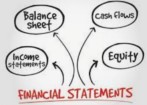Buffett explain the main purpose of financial statements. This article is an excerpt from Buffett’s 1988 shareholder letter.
Which three questions?
What needs to be reported is data – whether GAAP, non-GAAP, or extra-GAAP – that helps financially-literate readers answer three key questions:
- (1) Approximately how much is this company worth?
- (2) What is the likelihood that it can meet its future obligations? and
- (3) How good a job are its managers doing, given the hand they have been dealt?
In most cases, answers to one or more of these questions are somewhere between difficult and impossible to glean from the minimum GAAP presentation. The business world is simply too complex for a single set of rules to effectively describe economic reality for all enterprises, particularly those operating in a wide variety of businesses, such as Berkshire.
Corrupt practices of financial statements
Further complicating the problem is the fact that many managements view GAAP not as a standard to be met, but as an obstacle to overcome. Too often their accountants willingly assist them. (“How much,” says the client, “is two plus two?” Replies the cooperative accountant, “What number did you have in mind?”) Even honest and well-intentioned managements sometimes stretch GAAP a bit in order to present figures they think will
more appropriately describe their performance. Both the smoothing of earnings and the “big bath” quarter are “white lie” techniques employed by otherwise upright managements.
Then there are managers who actively use GAAP to deceive and defraud. They know that many investors and creditors accept GAAP results as gospel. So these charlatans interpret the rules “imaginatively” and record business transactions in ways that technically comply with GAAP but actually display an economic illusion to the world.
As long as investors – including supposedly sophisticated institutions – place fancy valuations on reported “earnings” that march steadily upward, you can be sure that some managers and promoters will exploit GAAP to produce such numbers, no matter what the truth may be. Over the years, Charlie and I have observed many accounting-based frauds of staggering size. Few of the perpetrators have been punished; many have not even been censured. It has been far safer to steal large sums with a pen than small sums with a gun.

Related articles
- “SEC asked: important risks disclosed in financial report“
- “Great primer books for Investing in the stock market“
Disclaimer
- The content of this site is the author’s personal opinions and is for reference only. I am not responsible for the correctness, opinions, and immediacy of the content and information of the article. Readers must make their own judgments.
- I shall not be liable for any damages or other legal liabilities for the direct or indirect losses caused by the readers’ direct or indirect reliance on and reference to the information on this site, or all the responsibilities arising therefrom, as a result of any investment behavior.